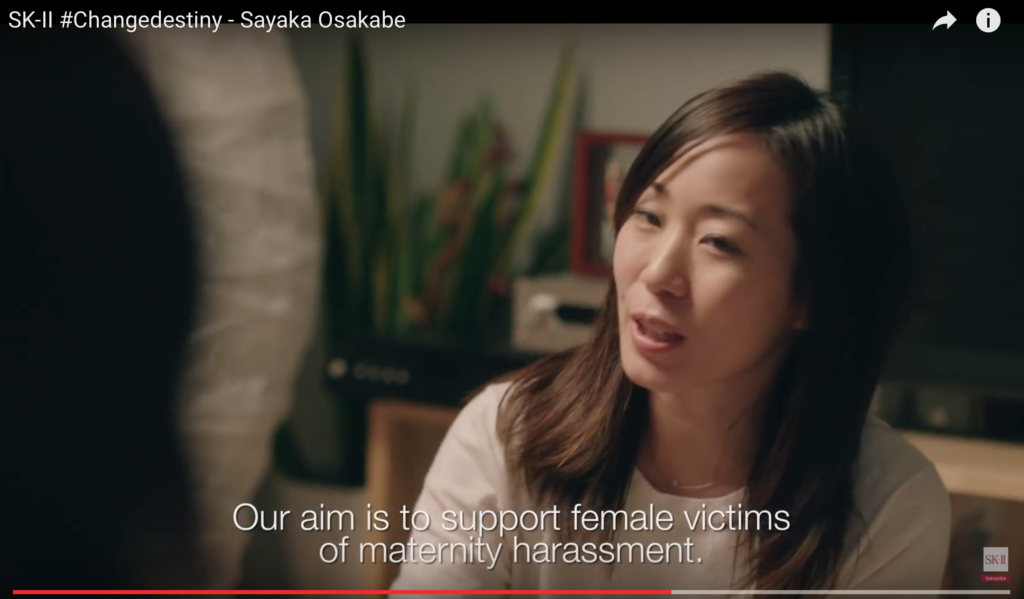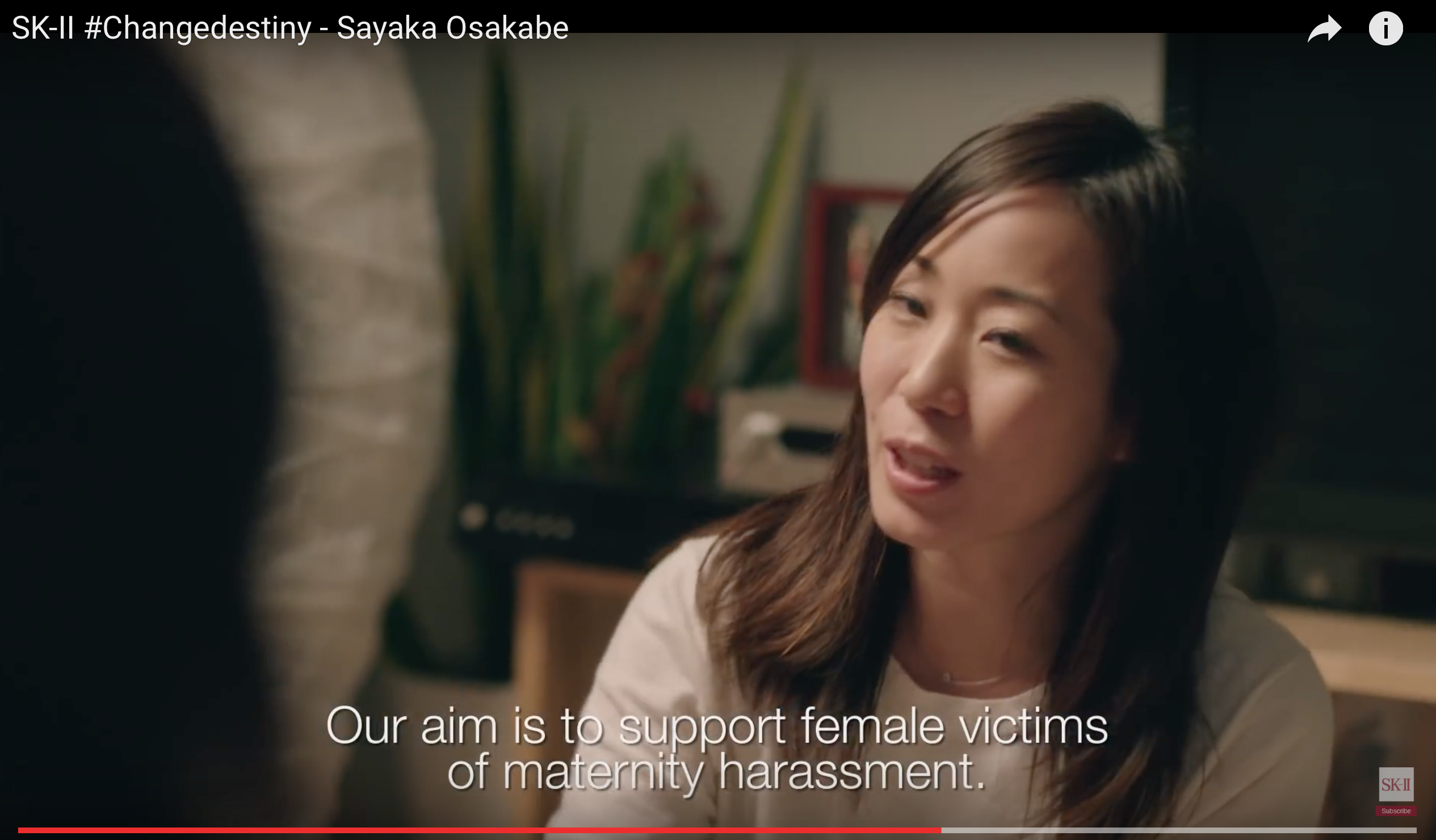
Working at one of Japan’s megabanks, a workplace notorious for old-fashioned male attitudes, it wasn’t uncommon for Mrs X to be told, “Don’t you dare get pregnant!” or “If you get pregnant, we won’t give you any work!” from her colleagues.*
It was then that she became pregnant from her long-term partner. Unmarried unsure of how her workplace would react, she consulted with one of her colleagues.”It was then that a manager from another department heard from chance. He got angry and said, ‘Quit messing around! I will never allow the pregnancy of someone who isn’t married. If what you’re saying is true, then I will not treat you like a human being!'” she told JSRC.
“Eventually I couldn’t stand the atmosphere and fear in the workplace and chose to abort (the child).”
The Peeling Face Of Womenomics
Japan faces a tough hurdle of an aging population coupled with a low birth rate. Prime Minister Shinzo Abe took office in 2013, pledging to solve the low birth rate and impending labor crisis, embraced a policy dubbed “womenomics,” and reviving the economy by raising the number of women in leadership positions to 30 percent by 2020. A pledge he has since backed away from.
It’s a hard task, considering that Japan’s business world is dominated by deep-rooted sexist attitudes that favor male workers over females and women, who are considered a bad investment due to the belief that they’ll quit when they marry and have children. Japan ranked 101 out of 142 assessed countries in 2015, according to a study released by the World Economic Forum.
And if a woman does become pregnant, while working, some are subjected to what the media has dubbed matahara (マタハラ).
According to Japanese Trade Union Confederation, matahara is an abbreviation of “maternity harassment.” The word refers to mental or physical harassment that some workingwomen go through when they announce to their colleagues that they’re pregnant or after they come back to the office from maternity leave. Some women come back to find themselves demoted or receiving a pay cut. In the worst-case scenario, some are even pressured to quit or fired. Harassment comes not only from men in the office but other women as well—sometimes out of irritation that their workload will increase, sometimes out of a kind of jealousy.
Prime Minister Abe’s former education advisor, Ayako Sono, infamous for publishing a column in a major Japanese newspaper advocating apartheid as part of immigration policy, said that “maternity leave is an unfair burden on Japanese companies” while still advising education policy.
Under the Equal Employment Opportunity Law, employers are required to pay consideration to pregnant women by offering them shorter work hours or flexible work schedules. They’re also banned from firing or demoting expectant mothers due to pregnancy and required to give them maternity leave. (Men are also technically allowed to take maternity leave as well to help in the first few weeks after a child is born.)
In practice, however, the law is hardly followed—and the local courts are hardly sympathetic. A physical therapist in Hiroshima was stripped of her job title and her managerial allowance following her second pregnancy—and her request for a “lighter workload”–in 2008. The woman, who had been working at the hospital since 1994 and was promoted to vice-director of her department in 2004 was told that there were no vice-director positions available when she came back. She sued her employer for violating Article 9.3 of the Equal Employment Opportunity Act and Article 10 of the unwieldy Act on the Welfare of Workers Who Take Care of Children or Other Family Members Including Child Care and Family Care Leave and gender discrimination.
The Hiroshima District Court and High Court rejected both of her claims on February 23 and July 19, 2012, with the District Court arguing that “the plaintiff never objected to the shift to a lighter workload.”
It took until October 2014 for the Supreme Court to strike down the decisions make in the lower courts. The Yomiuri Shimbun reported that the Supreme Court ordered the woman’s former employer to pay 1.75 million yen in damages. The court sent the case back down to the Hiroshima High Court, arguing that the proceedings regarding the necessity for a demotion were insufficient.
Maternity harassment sometimes extends outside of the workplace. The Japanese Ministry of Health, Labor and Welfare has been producing pregnancy badges since 2006 that say “I have a baby in my stomach” for expectant mothers to wear on public transportation to let other passengers know that she is pregnant.
A large percentage of the Japanese male public is unaware about these badges. A government survey released last September revealed that over 60 percent of Japanese men had never heard about the badges, Jiji press reported.
In some instances the badges have instead become a source of trouble, even harassment for the women who wear them. One Mainichi Shimbun reporter who followed an expectant mother on her daily commute and found that even though her source stood in front on the priority seats—special seating on the train reserved for elderly, disabled, and pregnant passengers—other passengers rarely stood up to give up their seats.
Other expectant mothers wearing the badges have alleged on social media websites such as Twitter that they had experienced verbal and physical harassment from strangers such as being elbowed or knocked down.
One anonymous poster on an online forum wrote in regard to the pregnancy badges, “Do [these badges] mean ‘I want you to reward me because I’m pregnant’? I just think it’s strangely brazen.”
So Abe faces a tough task in changing business and societal attitudes towards women in order to solve the country’s labor shortage, especially when members of his very own party display the same chauvinistic attitudes that pressure women in the corporate world to leave their careers.
The policy has failed horribly. Of the record five female ministers appointed to Abe’s second cabinet to set an example, two resigned in the same day due to misuse of campaign funds. Two other female ministers came under fire for links to extreme Nazi groups.
Deputy Prime Minister—and Shinzo Abe’s second-in-command and a likely candidate for being the next Prime Minister—Taro Aso said at a speech in December of 2014 in Sapporo, “There are many people who are creating the image that (increasing numbers of) elderly people is bad, but more problematic is people who don’t give birth.”
The Abe government even abolished the babysitting discount ticket system, the Sankei Shimbun reported. The tickets, which were distributed to 3, 000 people through 1, 300 companies, allowed working women to place their sick children, who are unable to attend a daycare when ill, with babysitters for a discounted price.
On March 31st 2015 the Ministry of Health, Labour and Welfare decided to consider the termination of a female worker’s employment within one year after the end of her maternity leave as “illegal” and issue warnings to companies who violate this law.
“In regard to companies that violate the law, we will provide administrative guidance to rectify the situation by advising them, then guiding them, and then making recommendations. If they do not follow our recommendations, we will publish their company name,” said Hitomi Komorizono, an official from the Equal Employment Opportunity Policy Division of the Ministry of Health, Labour and Welfare.
However, the move still has victims doubting that it will change the situation.
“I don’t think that just because this notice came out the Ministry of Health, Labour and Welfare, that things will improve,” says Sayaka Osakabe, a former victim of maternity harassment who founded an online network for other victims called Matahara.net.
“However, because of this notice, I think that it will be easier for female workers to raise their voices.”
During a session of the Tokyo Metropolitan Assembly, when Ayaka Shiomura was giving a speech on women’s issues, members from the Liberal Democratic Party section of the room yelled out jeers telling her to “hurry up and get married” and “why can’t you have babies?”
It’s a tough spot for Japanese women. On one side of the spectrum they’re being punished in the workplace for giving birth to children. On the other side they’re being told to breed. Either way, simply existing as a woman in Japan seems to be considered an inconvenience. The lack of affordable day care is another problem altogether.
Is it any wonder the number of women giving birth declines?
* Previously published on September 16, 2016.

From my experience, this is hyperbole. Work with a lot of pregnant women over the years in Japan, never saw this at all…… My Japanese wife never experienced this at all. (Matahara at work).
Oh and I ran a tempdesk at a megabank in Japan that served a lot of maternity cover — never saw this at all. In fact, I saw the complete opposite.
In terms of people giving up seats on a train, it really depends when and where you travel and at what time.
We have two kids and in both instances, people gave up their seats to my wife and sometimes offered me, too, which I refused.
For those that don’t give up seats, it’s pretty silly to say it’s because “she’s pregnant” as I’ve seen plenty of people not even give up seats for obviously retarded or handicapped people.
Thank you for writing in. I don’t think every woman experiences this but perhaps your experience isn’t typical of the experience of others. The Japanese government thinks it’s enough of a problem to officially address it.
Incredibly rude to call people ” retarded “, just saying…
Thank you, Jake, for this interesting article.
When will (?) the movie be coming out?
Ask again in January.
[…] Shinzo Abe as his progressive policy to elevate the status of women in what is still a very sexist and unequal society, where women are far from being empowered. The Global Gender Gap report […]
Oh, ok. Japan know what’s up. Keep it up. No, it’s not your right to jump through corporate hoops and produce children at the same time. You’re not doing either of those things right – it’s impossible.
[…] Hey, Baby? You’re fired, don’t come back. Maternity Harassment (MATAHARA) and The Working Woman in Japan 投稿日 2017 年12 月15 日 08:52:33 (japantrend) […]